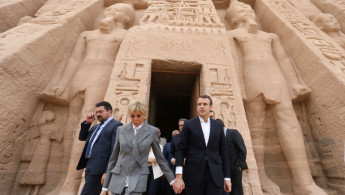French president visits Egypt to reinforce ties despite regime's appalling rights record
French President Emmanuel Macron arrived Sunday in Egypt, stopping to visit an iconic temple in the country's south before heading to Cairo to meet President Abdel Fattah al-Sisi.
Macron's three-day trip is aimed at reinforcing ties with the Sisi regime despite serious concerns over the country's deteriorating human rights record.
The French leader is accompanied by five government ministers, two dozen representatives from academic, cultural, and scientific fields and a dozen business leaders.
He is set to meet Sisi on Monday and sign deals between the two states.
Some 30 deals worth several hundred million dollars are expected to be signed in the fields of transport, renewable energy, health and agri-food.
Egypt enjoys the support of France, which sees the Arab world' most populous country as central to stability in the region despite concerns of non-governmental organisations about human rights.
The visit comes days after Amnesty International warned that an intensified crackdown on dissent in Egypt made the country "more dangerous" than ever for peaceful critics of the government.
The statement from the group came ahead of the eighth anniversary of the January 25, 2011 uprising which led to the ouster of longtime ruler Hosni Mubarak.
Amnesty said Egyptian authorities had arrested at least 113 people during 2018 for "peacefully expressing their views".
"Today it is more dangerous to openly criticise the government in Egypt than at any other time in the country's recent history," said Najia Bounaim, the group's North Africa Campaigns Director.
As army chief, Sisi led the overthrow of Egypt's first freely elected president Mohamed Morsi in 2013 after mass street protests against the Islamist leader's rule.
Sisi was re-elected in March 2018, winning a second four-year term after securing more than 97 percent of the vote in the absence of any serious competition.
Human rights groups have regularly criticised Sisi's government for cracking down on secular and left-wing activists, as well as the Islamist supporters of the banned Muslim Brotherhood group.





 Follow the Middle East's top stories in English at The New Arab on Google News
Follow the Middle East's top stories in English at The New Arab on Google News
![Israeli forces ordered bombed Gaza's Jabalia, ordering residents to leave [Getty]](/sites/default/files/styles/image_330x185/public/2176418030.jpeg?h=a5f2f23a&itok=_YGZaP1z)

